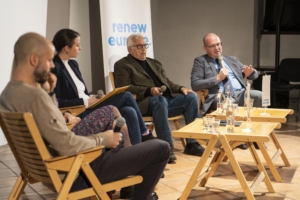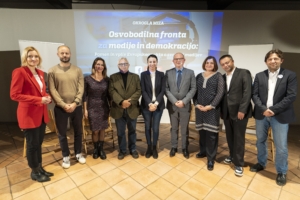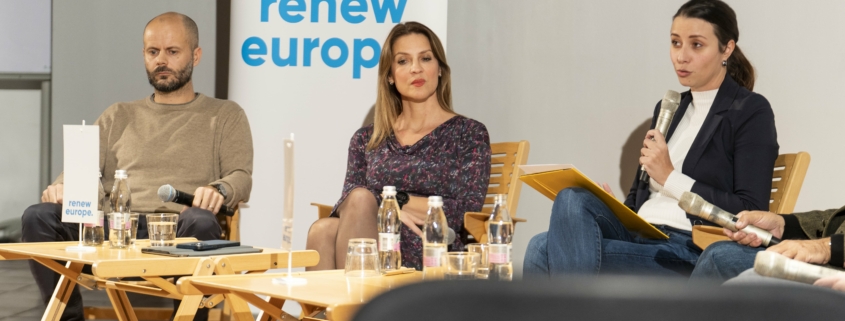On Thursday, 17 November 2022, MEPs Irena Joveva and Klemen Grošelj (Renew Europe) organised an event called “The Liberation Front for Media and Democracy” to analyse the state of media freedom and the contemporary challenges of journalism in Slovenia and beyond. Joveva pointed out that ensuring quality and professional journalism requires constant effort, because once the public media serve nothing more than the propaganda of one political party, it is very difficult to get back on an even keel.
In addition to the two MEPs, the event was also attended by journalist and former editor and TV presenter Tone Hočevar, research fellow at the Faculty of Social Sciences and former secretary at the Ministry of Culture Tanja Kerševan Smokvina, and journalist at the newspaper Večer and teaching assistant at the Faculty of Social Sciences Blaž Petkovič.
Stéphane Séjourné, President of Renew Europe, and Sabine Verheyen, Chair of the European Parliament’s Committee on Culture and Education, also welcomed the roundtable participants and live web stream viewers with a video address.
The discussion revolved, among other things, around the European legislation in this area, in particular the European Media Freedom Act. The interlocutors agreed with MEP Joveva’s view that a single legislative proposal will unfortunately not solve all the problems in the media field, but stressed that it was important that things were moving in the right direction. Joveva, who is likely to act as Renew Europe Group’s rapporteur on this file, gave her full commitment to help draft the text in a way that would address as wide a range of issues as possible in the field of the media and, above all, guarantee the media’s autonomy, freedom, professionalism and the best possible working conditions.
 Grošelj, meanwhile, expressed his concern about the fact that the issue of media freedom and democratic standards must be dealt with in 21st-century Europe. In his view, one should not overlook that the worsening of the media situation is a deliberate process, which is closely linked to the increasing radicalisation of society and to which Slovenia is not immune either. He also stressed that the media space, which used to be occupied by the public media, will be taken over by capital with its own interests, which will not be identical to the public interest.
Grošelj, meanwhile, expressed his concern about the fact that the issue of media freedom and democratic standards must be dealt with in 21st-century Europe. In his view, one should not overlook that the worsening of the media situation is a deliberate process, which is closely linked to the increasing radicalisation of society and to which Slovenia is not immune either. He also stressed that the media space, which used to be occupied by the public media, will be taken over by capital with its own interests, which will not be identical to the public interest.
Tanja Kerševan Smokvina agreed with this opinion but welcomed the fact that the marketing aspect of media law is moving towards greater protection of democratic standards and human rights: “The scientific research community welcomes the shift from strictly marketing approaches to a more scientific approach in media law. “At the same time, she is pleased with the greater commitment and courage shown by the European Commission, as attempts to change the media landscape have often been diluted by the power of big lobbies and pressure from corporations:
“Often these initially good intentions have been diluted by the interests of Member States and large corporations, which have always lobbied hard. “
Blaž Petkovič spoke about the importance of actively monitoring changes in the media sector and in the legislation governing it: “I think it is important that every time politicians strive to change legislation, we pay close attention. And that we ask ourselves what the purpose might be. What are the changes they are trying to achieve? What is behind it? Who is assisting the endeavours? Who is lobbying? In brief, there have been sufficient attempts in our region where we didn’t know what was going on behind the scenes and for that reason we really need to be on guard and follow the developments in the media policy.”
Tone Hočevar opined that so far no media freedom legislation could be successfully adopted in Slovenia because this is what has often suited the people in charge:
“I am talking, first and foremost, about the public service media, and about RTV in particular. And so far no party has been willing to put a stop on political influence or to step on the gas to see such legislation through.“
 The speakers concluded the event by expressing their hope that this time, however, the situation will change for the better through legislative changes to be adopted at the national and European levels. In her final words, MEP Joveva called to remove politics from the governing bodies, to put in place sufficient safeguards at all levels to ensure the sustainable independence of the public service media, to create the conditions for the replication of a culture of professionalism in the public service media, and to ensure not only that the public service media are financially sustainable and independent, but also that viewership and influence of critical reporting in the public service media is maintained given the current technological world and the need to counter misinformation, threats to journalists and the erosion of their credibility.
The speakers concluded the event by expressing their hope that this time, however, the situation will change for the better through legislative changes to be adopted at the national and European levels. In her final words, MEP Joveva called to remove politics from the governing bodies, to put in place sufficient safeguards at all levels to ensure the sustainable independence of the public service media, to create the conditions for the replication of a culture of professionalism in the public service media, and to ensure not only that the public service media are financially sustainable and independent, but also that viewership and influence of critical reporting in the public service media is maintained given the current technological world and the need to counter misinformation, threats to journalists and the erosion of their credibility.
The debate is accessible on this LINK.





Leave a Reply
Want to join the discussion?Feel free to contribute!